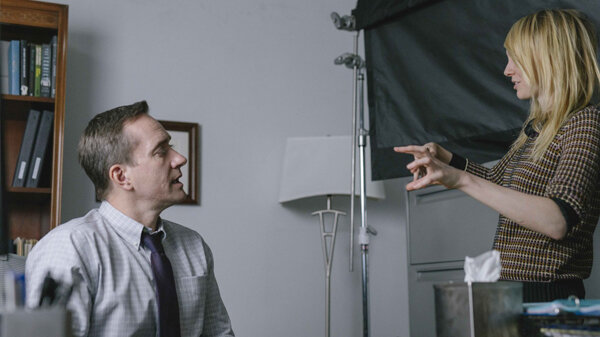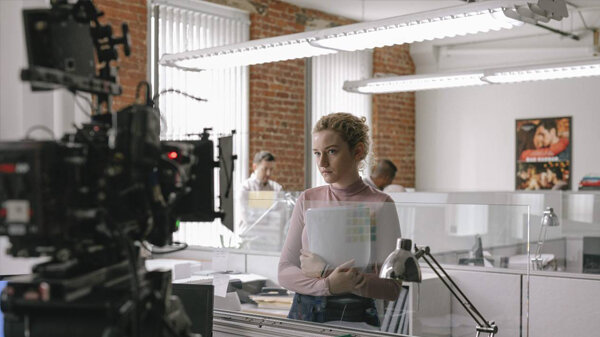Touted by many as the first post-#MeToo film, The Assistant is forcing systemic reproachable behaviour in the film industry to take a hard look in the mirror. Millicent Thomas speaks to the film’s director Kitty Green to find out how she made one of the most intelligent films of the year.
Kitty Green’s intimate and restrained The Assistant has been called “The Harvey Weinstein movie” countless times since its debut at the 2019 Telluride Film Festival. A true product of #MeToo, the film marks the director’s first foray into narrative fiction, having previously directed documentaries including the critically acclaimed Casting JonBenet. However timely the film, though, to reduce it to “The Harvey Weinstein movie” doesn’t feel quite right.
In The Assistant, Green hands the narrative back to survivors. No real attention is paid to the male predator, in fact, the viewer never even sees him – the proof of his power is in how much his presence is felt despite this. Julia Garner stars as a young graduate working as an assistant to an influential film executive, and chronicling just 24 hours of her life, The Assistant leaves a searing impression. I talked to Kitty Green over the phone about what propelled her to tell this story, working with Garner, and changing the conversation.
Coming from working on documentaries, what inspired you to tell this story as a narrative feature?
It's all about what the best way to tell that specific story is. Here it was all about the microaggressions and looks and gestures and glances, and the kind of behaviour that often goes unnoticed in office environments. That's something you can really amplify in a fiction movie, because you can get close up, and just having the time to be able to focus on those details was important to me.
The film is being called a #MeToo movie, a descriptor we're hearing more and more. Was the beginning of the movement when you began working on the film?
I was actually working on something different about consent on college campuses at the time. I was travelling around colleges and chatting to students about consent and power structures. Before the rise of the #MeToo movement, that’s where these kinds of conversations were being had, and there was a lot of talk about misconduct. So that’s where I began – then the Weinstein story broke while I was chatting to students. My phone just blew up. A few of my friends had worked for Weinstein himself, and a lot of my friends had worked for other big boss powerful men, so I started asking lots of questions and immediately sort of shifted focus to them and their work environments, and what it was like to be a woman in an office like that.
From those conversations you were having, how did you find it evolved to focus on the life of an assistant within these production companies?
When I was looking at the coverage of the #MeToo movement, everyone seemed to be talking about these bad men and their bad behaviour, and there seemed to be this idea that we get rid of a few bad men and then all will be fixed. I knew it was a bigger problem than that; it’s structural and cultural, and that was something I wanted to explore. So I thought, rather than looking at it top-down, I started looking at it bottom-up. Like, why aren’t women getting into positions of power? What’s preventing women from getting into positions of power? What’s getting in their way? How gendered are these environments? That became my line of inquiry, and I spoke to many assistants who didn't feel like there was a path for them in the film industry, and a lot of them even left. I wanted to kind of track that and figure out why. What’s going on? What are these environments like to make them feel that way?
The assistant herself, Julia Garner, is phenomenal. What was it like working with her on set, especially as she is in every scene?
Yeah, it's a really big job. I didn't have anyone in mind when I wrote it. I wanted someone interesting to look at, someone striking, because she’s performing mundane tasks throughout most of the film so she had to have that energy and be interesting herself. I had seen Julia in The Americans so I met with her, and got along really well.
We had a very short shoot – only 18 days – so we knew that we had to go into it knowing exactly what we wanted to show and how she was feeling at any given moment, because there wouldn’t be time on set for those discussions. We had almost a month blocked out for rehearsals and conversation time to explore the character and her emotional state. Julia and I interviewed assistants together and talked to women who would work in those environments. It was a big process, but Julia is wonderful. She is so kind and generous and it was a real pleasure working with her.
The film's centre is the scene in HR, where the protagonist attempts to voice her concerns. I found it really hard to watch because the conversation felt so familiar, one that every woman has had in some form. What was your writing process for that scene?
I spoke to nearly 100 women who had worked as assistants and gone to HR, and “gaslit” was a word that came up a lot. The idea that you always leave the room kind of doubting, or being confused about why you even went in in the first place. I was also looking to explore this idea that HR departments are in fact there to protect the company and not the employees. So often people go in to try and voice concerns and then realise that they're actually faced with almost a brick wall. But I also didn’t want [Wilcock] to be mean; there's one way to write it where he's just angry and cruel, and I didn’t want that. I wanted him to be kind of clear in his thinking, because there’s nothing he says that really doesn't make sense. She’s got the dots, she just can’t join them. I’m so happy we got Matthew Macfayden, who is incredible, and it’s really a balance at play between the two of them. That was a 12-page scene and he and Julia did it again and again, and each time it got more intense and it was an incredible scene to work on with them.
It's interesting that you say everything he says makes sense, as maybe that’s why it was so hard to watch. Everything he's saying is right, but it still felt like he was completely missing the point.
I'm not sure he's missing it, I think he knows what she's saying. He just knows how to
squash it or make it go away and, essentially, how to protect the company. He's like part of the machinery around this predator that protects him and keeps him in power. So creepy.
The routine of Jane’s life plays such a huge role in the viewing experience. It creates a rhythm in the protagonist's daily life. Was that rhythm always in the script, or was that a result of exploring what worked on set or in the edit?
Due to how short the shoot was, we actually had no time to really explore, we used exactly what we shot.
I basically wanted to present one authentic day, to show what it’s like to be in the shoes of the youngest woman in an environment like that. I would say to friends, “I’m making a film about this” and they would kind of say things like, “Oh, the enablers,” or they would give her that type of label. But I wanted to explore the complexity of being in her position and the idea that she has the least power, like what are her choices? What can she do?
So the audience experiencing her day as she does was important; the act of making the coffee has just as much dramatic weight in the movie as her picking something up off the couch. It’s just one day in her life as she would live it, which means barely any music, authentic sound design, office noises. We didn’t want to manipulate or sensationalise in any way.
A lot of Hollywood assistants are currently moving towards unionising, so it feels like this film comes at the right time. What do you hope audiences might take from watching it?
I've had a lot of people who have come out of the film who are bosses and have assistants themselves, and they have said that they're going to think about the way they treat their assistants the next day – that kind of reaction is incredible. Also I’ve spoken to young women who see themselves in the character, and are grateful to see it reflected on screen. But, most of all, I just want more conversations about these bigger, more cultural and systemic problems as opposed to just talking about Harvey Weinstein. I want the conversation to move now to how we can make places more fair and safe and equitable, how we can get more women into positions of power.
The Assistant is now available to rent on Amazon Video, Google Play, iTunes, Curzon Home Cinema and BFI Player.
Millicent (@MillicentOnFilm) is a freelance journalist based between Manchester and Bath. She writes for publications such as GamesRadar, Dazed, Little White Lies, SciFiNow and more. She continues to defend Tomb Raider (2018) on Twitter.



